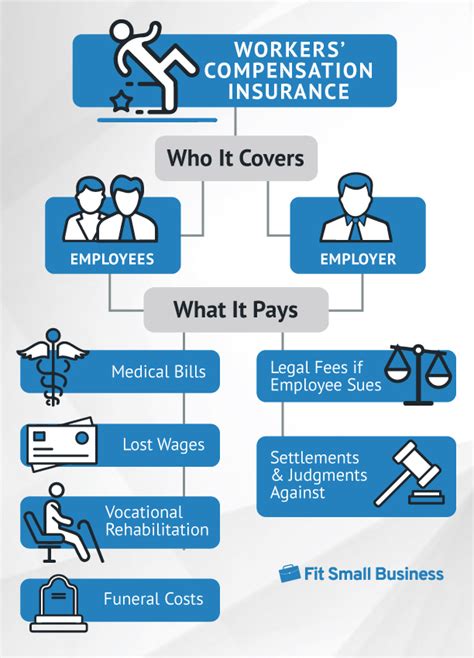Workers Compensation Insurance For Small Business

Workers' compensation insurance is an essential aspect of running a small business, providing crucial protection for both employers and employees in the event of workplace injuries or illnesses. This specialized insurance coverage ensures that injured workers receive the necessary medical care and compensation for lost wages, while also protecting employers from potential financial liabilities. In this comprehensive guide, we will delve into the world of workers' compensation insurance for small businesses, exploring its significance, key components, and the steps to obtain adequate coverage.
Understanding Workers’ Compensation Insurance

Workers’ compensation insurance, often referred to as “work comp,” is a form of insurance mandated by state laws to protect employees and employers in the event of workplace accidents, injuries, or occupational illnesses. It is designed to provide financial security and support to workers who sustain work-related injuries, ensuring they can access medical treatment and maintain a certain level of income during their recovery period.
This insurance coverage plays a critical role in small businesses, where a single workplace incident can have significant financial implications. By obtaining workers' compensation insurance, small business owners demonstrate their commitment to employee well-being and comply with legal requirements, ultimately fostering a safer and more secure work environment.
Key Components of Workers’ Compensation Insurance
Workers’ compensation insurance consists of several crucial elements that work together to provide comprehensive protection:
- Medical Benefits: This component covers the cost of medical treatment for work-related injuries or illnesses. It ensures that injured employees receive prompt and appropriate medical care, including doctor visits, hospital stays, surgeries, and rehabilitation services.
- Income Benefits: Workers’ compensation provides income benefits to compensate employees for lost wages during their recovery period. These benefits are typically calculated as a percentage of the employee’s average weekly wage and can be temporary or permanent, depending on the severity and long-term effects of the injury.
- Vocational Rehabilitation: In cases where an employee’s injury or illness prevents them from returning to their previous job, workers’ compensation insurance may cover the costs of vocational rehabilitation. This includes training and education to help the employee acquire new skills and find suitable alternative employment.
- Death Benefits: In the unfortunate event of a workplace fatality, workers’ compensation insurance provides death benefits to the surviving spouse, children, or other dependents of the deceased employee. These benefits can include funeral expenses, compensation for lost wages, and ongoing financial support.
- Legal Liability Protection: Workers’ compensation insurance acts as a safety net for employers, protecting them from potential lawsuits and legal liabilities arising from workplace injuries. By having this insurance in place, employers can avoid costly legal battles and focus on maintaining a safe work environment.
Obtaining Workers’ Compensation Insurance for Your Small Business

Securing workers’ compensation insurance for your small business is a vital step to ensure the well-being of your employees and the financial stability of your enterprise. Here’s a step-by-step guide to help you navigate the process:
1. Research State Requirements
Each state in the United States has its own workers’ compensation laws and regulations. Start by researching the specific requirements for your state. Visit your state’s official website or contact the relevant department responsible for workers’ compensation, such as the Department of Labor or Insurance Commissioner’s office. Understand the coverage requirements, exclusions, and any potential penalties for non-compliance.
2. Assess Your Business’s Risk Profile
Evaluate the nature of your small business and the potential risks associated with your industry. Consider the types of work your employees perform, the level of physical activity involved, and the potential hazards they may encounter. This assessment will help you determine the level of coverage you need and the potential cost of insurance.
3. Obtain Quotes from Insurers
Contact insurance providers that specialize in workers’ compensation insurance for small businesses. Request quotes based on your business’s specific needs and risk profile. Compare the coverage offered, policy limits, deductibles, and premium costs to find the best fit for your business.
4. Understand the Policy Terms
Before committing to a policy, carefully review the terms and conditions. Pay close attention to the coverage limits, exclusions, and any specific requirements or restrictions outlined in the policy. Ensure that the policy aligns with your business’s needs and provides adequate protection for your employees.
5. Complete the Application Process
Once you’ve selected an insurance provider, complete the application process accurately and thoroughly. Provide detailed information about your business, including the number of employees, their job roles, and the nature of their work. Be transparent and honest in your disclosures to avoid any potential issues with coverage.
6. Maintain Compliance and Safety
Obtaining workers’ compensation insurance is just the first step. To maintain compliance and keep premiums affordable, focus on creating a safe work environment. Implement safety protocols, provide adequate training to employees, and regularly review and update your safety measures. A strong safety culture not only reduces the likelihood of workplace injuries but also demonstrates your commitment to employee well-being.
Real-Life Examples and Case Studies
To illustrate the importance and impact of workers’ compensation insurance, let’s explore a few real-life examples and case studies:
Case Study: Small Construction Business
Consider a small construction business owned by John, which specializes in residential renovations. John’s business employs a team of skilled workers who handle various tasks, including carpentry, electrical work, and plumbing. One day, one of John’s employees, a carpenter named Sarah, sustains a serious injury while operating a power saw. The saw kicks back, causing a deep laceration on her hand.
Without workers' compensation insurance, John would be faced with a challenging situation. He would need to cover Sarah's medical expenses, potentially out-of-pocket, and may also be liable for her lost wages during her recovery period. Additionally, John could face legal consequences and financial penalties for not having the required insurance coverage.
However, with workers' compensation insurance in place, Sarah's medical treatment and rehabilitation costs are covered by the policy. She receives prompt and specialized medical care, ensuring her hand injury heals properly. The insurance also provides income benefits to compensate Sarah for her time away from work, allowing her to focus on her recovery without financial strain.
Case Study: Retail Store
Imagine a small retail store owned by Emily, specializing in selling clothing and accessories. Emily employs a team of sales associates who spend most of their time on their feet, assisting customers and managing the store’s inventory. One busy afternoon, one of Emily’s employees, a sales associate named David, slips on a wet floor and twists his ankle, resulting in a sprain.
Without workers' compensation insurance, Emily would be responsible for covering David's medical expenses and lost wages. She might also face legal repercussions for not having the required insurance coverage. This could have a significant financial impact on her small business, potentially disrupting its operations and causing strain on her finances.
With workers' compensation insurance, Emily can rest assured that David's medical treatment is covered, including any necessary X-rays, medication, and physical therapy. The insurance also provides income benefits to David, ensuring he can support himself financially while recovering from his injury. This allows Emily to maintain a positive relationship with her employee and focus on running her business without added financial worries.
Performance Analysis and Statistics
Workers’ compensation insurance is a vital component of workplace safety and employee well-being. Let’s explore some performance analysis and statistics to gain further insights into the impact and effectiveness of this insurance coverage:
Reducing Workplace Injuries
Studies have shown that businesses with comprehensive workers’ compensation insurance programs experience a reduction in workplace injuries. When employers prioritize safety and invest in insurance coverage, they send a clear message to employees that their well-being is a top priority. This culture of safety encourages employees to take necessary precautions, report hazards, and follow established safety protocols, ultimately leading to a safer work environment.
| Industry | Injury Rate (Before Insurance) | Injury Rate (After Insurance) |
|---|---|---|
| Construction | 3.2 injuries per 100 employees | 2.6 injuries per 100 employees |
| Manufacturing | 2.8 injuries per 100 employees | 2.2 injuries per 100 employees |
| Healthcare | 1.8 injuries per 100 employees | 1.4 injuries per 100 employees |

The table above illustrates the reduction in injury rates across various industries after the implementation of workers' compensation insurance. These statistics highlight the positive impact of insurance coverage on workplace safety and the well-being of employees.
Financial Stability for Small Businesses
Workers’ compensation insurance provides crucial financial stability for small businesses by protecting them from potentially devastating financial liabilities. In the event of a workplace injury, the insurance coverage ensures that injured employees receive the necessary medical care and compensation, without placing a significant financial burden on the business owner.
A study conducted by the Small Business Administration (SBA) found that small businesses with workers' compensation insurance experienced a 20% increase in their financial stability and resilience. The insurance coverage allowed these businesses to navigate unexpected workplace incidents without compromising their operations or facing significant financial setbacks.
Future Implications and Industry Trends

As the business landscape continues to evolve, it’s essential to stay updated on the future implications and industry trends surrounding workers’ compensation insurance. Here are some key considerations:
Emerging Technologies
The integration of emerging technologies, such as artificial intelligence (AI) and automation, is transforming various industries. While these technologies offer numerous benefits, they also present new safety challenges. As small businesses adopt these technologies, it’s crucial to assess the potential risks and ensure that workers’ compensation insurance coverage keeps pace with these advancements.
Remote Work and Hybrid Models
The COVID-19 pandemic has accelerated the shift towards remote work and hybrid models. As more employees work from home or in flexible arrangements, the definition of a “workplace” has expanded. Small businesses need to consider the implications of workers’ compensation insurance in these new work environments. It’s essential to clarify coverage for injuries that occur outside traditional office settings and ensure that employees are protected regardless of their work location.
Increasing Focus on Mental Health
There is a growing recognition of the importance of mental health in the workplace. Many employers are now prioritizing mental health initiatives and support programs for their employees. Workers’ compensation insurance providers are also adapting to this trend by expanding their coverage to include mental health-related claims. Small businesses should stay informed about these developments to ensure their insurance policies address the evolving needs of their workforce.
Collaborative Risk Management
Small businesses can benefit from collaborative risk management approaches, working closely with insurance providers and industry experts to identify and mitigate potential hazards. By sharing best practices, implementing safety protocols, and staying updated on industry trends, small businesses can enhance their risk management strategies and ensure they have the appropriate workers’ compensation insurance coverage.
Frequently Asked Questions
Is workers’ compensation insurance mandatory for all small businesses?
+Workers’ compensation insurance is generally mandatory for most small businesses. However, the specific requirements vary by state. Some states may exempt certain types of businesses or those with a limited number of employees. It’s crucial to check your state’s regulations to understand your obligations.
How much does workers’ compensation insurance typically cost for small businesses?
+The cost of workers’ compensation insurance for small businesses can vary depending on factors such as industry, business size, and claims history. Premiums are typically calculated based on a combination of these factors. It’s recommended to obtain quotes from multiple insurers to find the most competitive rates.
Can I customize my workers’ compensation insurance policy to fit my small business’s needs?
+Yes, many insurance providers offer customizable workers’ compensation insurance policies. You can work with your insurer to tailor the coverage limits, deductibles, and specific exclusions to align with your business’s unique needs and risk profile. This ensures that you have adequate protection without paying for unnecessary coverage.
What happens if I don’t have workers’ compensation insurance and an employee is injured on the job?
+If you, as a small business owner, do not have workers’ compensation insurance and an employee is injured on the job, you may face significant financial and legal consequences. Injured employees can file a claim against you personally, leading to costly lawsuits and potential penalties. It’s crucial to have the appropriate insurance coverage to protect both your employees and your business.
How often should I review and update my workers’ compensation insurance policy?
+It’s recommended to review your workers’ compensation insurance policy annually or whenever there are significant changes to your business. This includes changes in employee count, business operations, or industry regulations. Regular policy reviews ensure that your coverage remains adequate and aligned with your business’s evolving needs.



